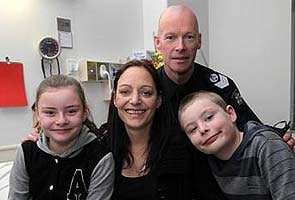
Australian woman Vanessa Tanasio (centre)
Sydney:
An Australian woman has lived to tell the tale after being brought back to life from being clinically dead for 42 minutes, doctors said on Monday.
Mother-of-two Vanessa Tanasio, 41, was rushed to Monash Medical Centre in Melbourne last week after a major heart attack, with one of her main arteries fully blocked.
She went into cardiac arrest and was declared clinically dead soon after arrival.
Doctors refused to give up and used a compression device called a Lucas 2 -- the only one of its kind in Australia -- to keep blood flowing to her brain while cardiologist Wally Ahmar opened an artery to unblock it.
Once unblocked, Tanasio's heart was shocked back into a normal rhythm.
"(I used) multiple shocks, multiple medications just to resuscitate her," Ahmar said. "Indeed this is a miracle. I did not expect her to be so well."
Tanasio said she had no history of heart conditions and was grateful to be alive.
"I remember being on my couch, then the floor, then arriving at hospital, and then two days go missing," Tanasio said.
"I was dead for nearly an hour and only a week later I feel great. It's surreal."
The Lucas device physically compresses the chest, like during cardiopulmonary resuscitation (CPR), allowing doctors to work non-stop to put a stent into a blocked artery.
It is the first a time a patient has successfully used the device, which was donated to the medical centre, for such a length of time in Australia, the hospital said.
Clinical death is a medical term for when someone stops breathing and their blood stops circulating.
Mother-of-two Vanessa Tanasio, 41, was rushed to Monash Medical Centre in Melbourne last week after a major heart attack, with one of her main arteries fully blocked.
She went into cardiac arrest and was declared clinically dead soon after arrival.
Doctors refused to give up and used a compression device called a Lucas 2 -- the only one of its kind in Australia -- to keep blood flowing to her brain while cardiologist Wally Ahmar opened an artery to unblock it.
Once unblocked, Tanasio's heart was shocked back into a normal rhythm.
"(I used) multiple shocks, multiple medications just to resuscitate her," Ahmar said. "Indeed this is a miracle. I did not expect her to be so well."
Tanasio said she had no history of heart conditions and was grateful to be alive.
"I remember being on my couch, then the floor, then arriving at hospital, and then two days go missing," Tanasio said.
"I was dead for nearly an hour and only a week later I feel great. It's surreal."
The Lucas device physically compresses the chest, like during cardiopulmonary resuscitation (CPR), allowing doctors to work non-stop to put a stent into a blocked artery.
It is the first a time a patient has successfully used the device, which was donated to the medical centre, for such a length of time in Australia, the hospital said.
Clinical death is a medical term for when someone stops breathing and their blood stops circulating.

